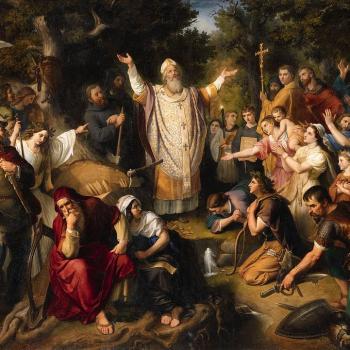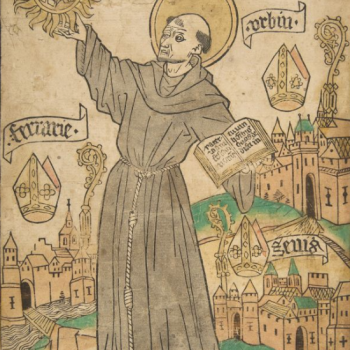The trouble in Milan arose when the bishop of diocese Milan, Auxentius, died. He had been an Arian and those sympathetic to the Arian cause were arguing with the Catholics about who would succeed Auxentius. Ambrose was in Milan as a governor, and went to the Church durring the time they were debating who would replace Auxentius. He began to address the Christians, but as Ambrose was speaking the crowd began to cry out that he should be Bishop. Although Ambrose was a member of the “catholic” party in this debate, he was perceived as someone acceptable to the Arians. Ambrose went into hiding to avoid becoming Bishop. However he was given up by his friend and within a week, Ambrose was baptized, ordained and duly consecrated bishop of Milan.
Here is what you should know about Ambrose:
- In his disputes with the Emperor Auxentius, he coined the principle: “The emperor is in the Church, not above the Church.
- Augustine was converted by Ambrose
- He fought for consecrated virginity (something that many Protestants have sadly lost)
- He used many non-christian sources to illustrate his theological points, calling it “gold of the Egyptians.”
- He is credited for stopping Arianism in Milan
- He was Anti-Semitic in some of his writings, refusing to condemn the violent distraction of a synagogue, This was a common flaw in many of the Fathers. (Ambrose sometimes spoke positively of Jews as well.)
- At one point, while the people of Milan were suffering, he melted the offering plate in order to assist in helping the needy.
- He threatened Theodosius with excommunication for the massacre of 7,000 persons at Thessalonica in 390. Theodosius repented.
- He was able to read silently, something rare in his day when people always read aloud.
- Ambrose’s body may still be viewed in the church of S. Ambrogio in Milan. It is one of the oldest bodies of a historical person that has been preserved (outside of egypt, at least. They have some pretty old mummies)
Here is a quote from Ambrose:
“Women and men are not mistaken when they regard themselves as superior to mere bodily creatures and as more than mere particles of nature or nameless units in modern society. For by their power to know themselves in the depths of their being they rise above the entire universe of mere objects…. Endowed with wisdom, women and men are led through visible realities to those which are invisible” (Pastoral Constitution on the Church in the Modern World, 14–15, Austin Flannery translation).













